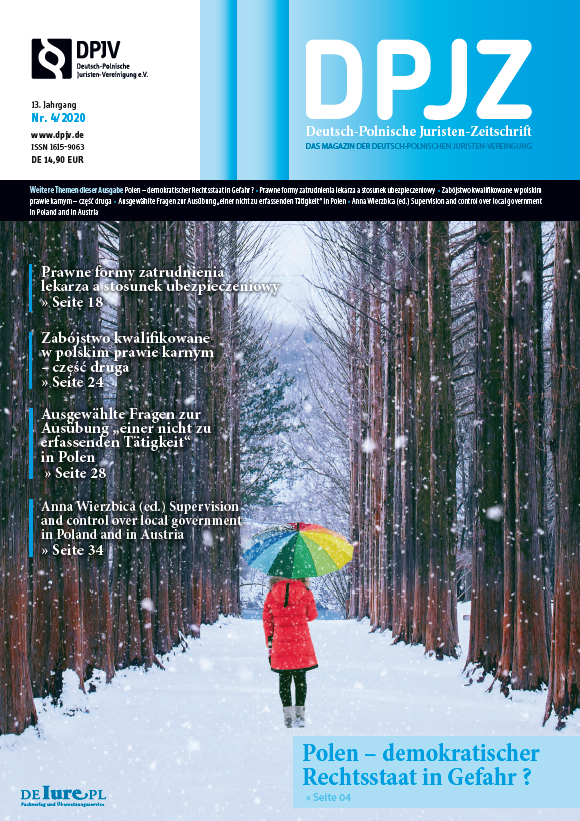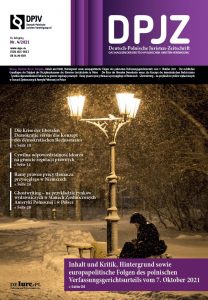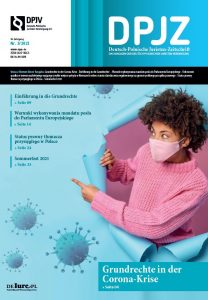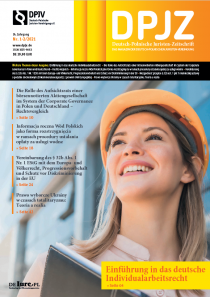I. Dr. Peter v. Feldmann
Polen – demokratischer Rechtsstaat in Gefahr?
Fortsetzung der Berichte in DPJZ Nr. 4/2016, Nr.1/2017, Nr. 2/2018 und Nr. 3-4/2018
Zusammenfassung
Die Justizreform ist weitgehend vollzogen, jedoch durch den Widerstand eines Teils der Richter des Obersten Gerichts, durch die Rechtsprechung des EuGH sowie durch den Widerstand eines großem Teils der Richterschaft und der Öffentlichkeit ins Stocken geraten. Welche Folgen sich aus diesem Zustand letztlich zukünftig ergeben, ist ungewiss. Die Bedeutung der Rechtsstaatlichkeit in Europa und Polen wird jedoch ganz erheblich geschwächt werden, wenn Polen, wie zu erwarten ist, die Rechtsprechung des EuGH zu den umstrittenen polnischen Justizgesetzen nicht hinnimmt und die Zuständigkeit des EuGH in diesem Bereich ablehnt.
Schlüsselwörter: Justizreform, Rechtsstaatprinzip.
Summary:
The judicial reform is largely complete, but has stalled due to opposition from some of the judges of the Supreme Court, from the case law of the ECJ and from opposition from a large part of the judiciary and the public. It is uncertain what the future consequences of this situation will be. The importance of the rule of law in Europe and Poland will, however, be considerably weakened if Poland, as is to be expected, does not accept the case law of the ECJ on the controversial Polish judicial laws and rejects the competence of the ECJ in this area.
Keywords: judicial reform, rule of law.
Über den Autor: Vorsitzender Richter am Oberverwaltungsgericht Berlin a.D., E-Mail: Peter von Feldmann feldhaasenp@t-online.de.
II. Agnieszka Huras-Darkowska
PRAWNE FORMY ZATRUDNIENIA LEKARZA A STOSUNEK UBEZPIECZENIOWY
Streszczenie:
Wykonywanie zawodu lekarza wiąże się ze szczególną odpowiedzialnością. W związku z tym ustawodawca zdecydował się na zastosowanie szczególnego reżimu przewidzianego dla wykonywania omawianego zawodu. Zagadnienia dotyczące specyficznych warunków, kryteriów oraz możliwości świadczenia usług leczniczych, unormowane są w kilku aktach prawnych. Lekarze mogą wykonywać swój zawód i mogą prowadzić działalność leczniczą.
Słowa kluczowe: lekarza, ubezpieczenie, umowa, zatrudnienie.
Summary:
Practicing as a doctor is associated with special responsibility. Therefore, the legislator decided to apply a special regime provided for the performance of the profession in question. Issues related to specific conditions, criteria and the possibility of providing medical services are regulated in several legal acts. Doctors may exercise their profession and may pursue therapeutic activities.
Keywords: doctor, insurance, contract, employment.
III. Piotr Góralski
Zabójstwo kwalifikowane w polskim prawie karnym – część pierwsza
Zusammenfassung:
Im Aufsatz wird die Genese der Einführung der qualifizierten Tötung (des Mordes) in die Regelungen des polnischen Strafgesetzbuches aus dem Jahr 1997 sowie der Umformulierung des Inhalts des Art. 148 § 2–3 des polnischen Strafgesetzbuches dargestellt, welche die Merkmale dieses Verbrechens enthalten hat. Im Folgenden wird der Inhalt der Merkmale der qualifizierten Tötung analysiert, indem es auf die häufigsten Ursachen und dem kriminologischen Hintergrund der Begehung dieser Art des Verbrechens hingewiesen wird. Die Analyse wird mit Rücksicht auf die Standpunkte der Vertreter der polnischen Strafrechtslehre und der Kriminologie sowie auf die in der gerichtlichen Rechtsprechung enthaltenen Thesen, durchgeführt. Im Aufsatz werden auch die grundlegenden Probleme beschrieben, die mit der Sanktionierung dieser Art von Verbrechen und mit dem Schutz der Gesellschaft vor Tätern der Morde verbunden sind. Als letzter Punkt werden die Änderungsvorschläge im Strafrecht präsentiert, welche die für eine qualifizierte Tötung vorgesehenen Strafen betreffen, die im Novelisierungsentwurf des polnischen Strafgesetzbuches vom 14. Mai 2019 enthalten sind.
Schlüsselwörter: Strafrecht, Strafgesetzbuch, Tötungsdelikte, Mord, strafrechtliche Verantwortung.
Summary:
This article describes the origin of introducing the aggravated murder to the regulations of the Polish Penal Code of 1997 and amending the contents of Art. 148 §2-3 of the Penal Code containing elements of that crime in the years 2005 – 2011. Then the contents of the elements of the aggravated murder were analysed with an indication of most common causes and criminological background for this type of crime. The analysis was conducted with inclusion of the views of the representatives of the Polish penal law science and criminology as well as the ones included in the judicial decisions. The article also discusses the fundamental problems related to the sanctioning of this type of crimes and protecting the society from the offenders. In the end, proposals of amendments in the penal law regarding penalties for aggravated murder set out in the draft amendment of the Polish Penal Code of 14th May 2019 were presented.
Keywords: Criminal law, criminal code, homicides, murder, criminal responsibility.
Über den Autor: Dr. hab. Piotr Góralski, Lehrstuhl für Materielles Strafrecht,
Fakultät für Rechts-, Verwaltungs- und Wirtschaftswissenschaften. Universität Wrocław, E-Mail: piotr.goralski@uwr.edu.pl.
IV. Magdalena Jaś-Nowopolska
Ausgewählte Fragen zur Ausübung „einer nicht erfassten Tätigkeit“ in Polen
Zusammenfassung:
Der Artikel befasst sich mit dem Gesetz über das Recht der Unternehmer vom 6. März 2018, welches einige neue Lösungen vorsieht. Insbesondere Art. 5 des Gesetzes wird bzgl. der historischen Entwicklung und den inhaltlichen Auslegungsmöglichkeiten näher beleuchtet. Es werden die verschiedenen Ansichten der Lehre dargelegt, die Unterschiede in den Auffassungen aufgezeigt und die Voraussetzungen, die eine nicht zu erfassende Tätigkeit (bezeichnet auch als: nicht zu registrierende Tätigkeit) charakterisieren, genannt. Des Weiteren wird der Frage nachgegangen, wie eine natürliche Person zu versichern ist, die eine nicht zu erfassenden Tätigkeit ausübt. Denn diese muss, solange alle Voraussetzungen erfüllt sind, nicht zwingend Sozial- und Krankenversicherungsbeiträge zahlen. Möglicherweise ist die Ausübung einer nicht zu erfassenden Tätigkeit auch gleichbedeutend mit den in den Steuervorschriften genannten Tätigkeiten, für die eine Steuerbefreiung vorgesehen ist. Zur Veranschaulichung wird das Gesetz über die Einkommenssteuer näher erläutert und die nicht zu erfassende Tätigkeit im Sinne des Gesetzes über das Recht der Unternehmer eingeordnet. Zum Schluss beschäftigt sich der Artikel mit der wegen der COVID-19 Pandemie sehr aktuellen Fragestellung, ob Personen, die eine nicht zu erfassende Tätigkeit ausüben, Anspruch auf finanzielle Unterstützung haben. Das von der polnischen Regierung erlassene Gesetz zur Bekämpfung der COVID-19 Pandemie enthält entsprechende Lösungen und Sicherungsmöglichkeiten für Unternehmer. Ob sich hierauf auch eine Person, die eine nicht zu erfassende Tätigkeit ausübt, berufen kann, wird ausführlich diskutiert.
Schlüsselwörter
Nicht zu erfassende Tätigkeit, Gesetz über das Recht der Unternehmer, COVID-19.
Summary:
The article deals with the Act of 6.03.2018 regarding Entrepreneur law, which provides some new solutions. In particular, article 5 of the Act is examined in more detail with regard to the historical development and the possibilities of interpretation of its content. The different views of the doctrine are presented, the differences of opinions are pointed out and the prerequisites which characterise a non-registered activity (called as: activity which is not to be covered) are mentioned. Furthermore, the question of how to insure a natural person who is engaged in a non-registered activity is examined. This is because, as long as all the conditions are met, the natural person does not have to pay social security and health insurance contributions. It is also possible that the pursuit of a non-registered activity may be equivalent to the activities listed in the tax rules for which an exemption is provided. The Act on Income Tax is explained in more detail and the activity not to be recorded is classified in the sense of the Act on Entrepreneurs law. Finally, the article deals with the issue of whether persons who carry out a non-registered activity are entitled to financial support due to the COVID-19 pandemic. The Act adopted by the Polish government to combat the COVID-19 pandemic contains appropriate solutions and safeguards for entrepreneurs. Whether a person who carries out a non-registered activity can also invoke them is being discussed in detail.
Keywords:
non-registered activity, Act Entrepreneur law, COVID-19.
Über die Autorin: Magdalena Jaś-Nowopolska – wissenschaftliche Mitarbeiterin am Lehrstuhl für Öffentliches Recht und Völkerrecht, Universität Gießen, E-Mail: Magdalena.Jas-Nowopolska@recht.uni-giessen.de.
V. Bogusław Przywora
Supervision and control over local government in Poland and Austria – rec. Anna Wierzbicka
Summary:
The monograph attempts to summarize issues relating to the supervision and control of local self-government in the Republic of Poland and the Republic of Austria. The choice of the topic and its approach should be considered valuable both for theoreticians and practitioners. Until now, there has been no monographic study on these issues. The work is written in two languages (Polish and German), which significantly expands the audience, favoring the process of internationalization of scientific research.
Słowa kluczowe: Samorząd terytorialny w Rzeczypospolitej Polskiej i w Republice Austrii, nadzór, kontrola.
Keywords: Local self government in the Republic of Poland and the Republic of Austria; Supervision, control.
Über den Autor: Professor Boguslaw Przywora, M.A., Ph.D, Dr Hab. – Chair of Department of Comparative Law at Jan Dlugosz University in Czestochowa, Poland. Professor Przywora is also the Head of the Legal Analysis Laboratory at the Faculty of Law and Economy at Jan Dlugosz University of Częstochowa. Received his Habilitation in Law at Jagiellonian University in Cracow. Graduated from School of Ukrainian Law (Lviv University of Ivan Franco in Lviv/Kyiv-Mohyla Academy/ Jagiellonian University in Cracow, and finished postgraduate studies in Banking Law at the Faculty of Law and Administration Jagiellonian University in Cracow, E-Mail: bprzywora@op.pl.



